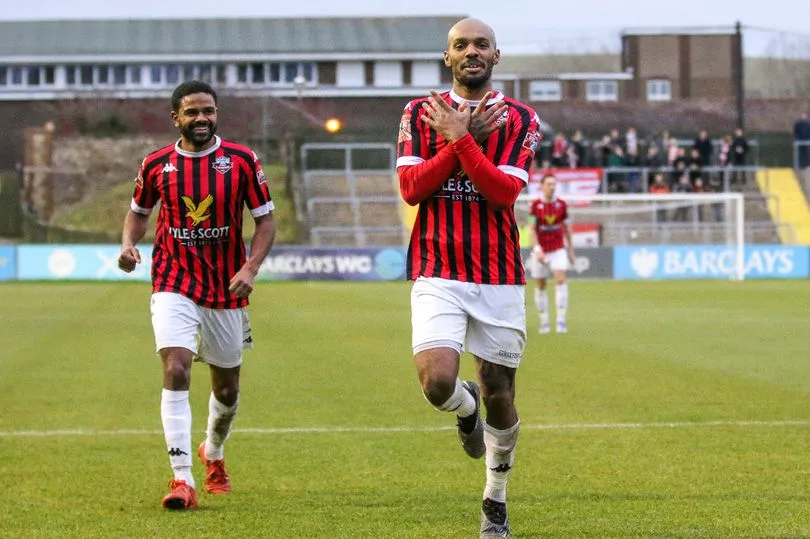It's a battle that has been raging for too long - and an issue where football is among the industries still some way from catching up.
But for pioneering Lewes FC, the gender pay gap is a problem they've already been tackling head on for years.
The East Sussex club bucked the trend back in 2017 with their groundbreaking initiative, EqualityFC, which saw them pledge and commit to running a football club led on equal pay, budgets and resources for its male and female players. Six years on, they remain the only club in world football to do so.
And with an FA Cup quarter-final against Manchester United on their doorstep and the future looking bright, it's remarkable other clubs have not yet followed suit.
"We felt it was the right thing for us to do," says Lewes women's general manager Lynne Burrell. "We’re the only professional/semi-professional club in the world that has equal pay and budgets but it does go beyond that, it’s about equal resources as well.
"I know a lot of people talk about pay parity, but our men’s and women’s teams play in the same stadium, the same pitch, they have the same resources, marketing budget, we have commercial and communications people who work across both sides of the club.
"It’s a really strong message about how we value the men’s and the women’s teams and players the same. It’s important."
Lewes are in the relatively rare position where their women's team are playing in a considerably higher tier in a more recognised division than that of their men. Currently seventh in the Women's Championship, Lewes will also welcome Women's Super League title chasers Man Utd to their stadium, The Dripping Pan, on Sunday in a huge FA Cup clash.
Meanwhile, their men's team are pushing for a playoff place in the Isthmian Premier Division and make the trip to Folkestone Invicta in a league game on Saturday - though there is no doubt both sides of the club will be eagerly supporting the other.

"Both the men’s and the women’s sides understand that success is good for the other half of the equation," Burrell said. "No one is losing out by this.
"If the women’s team do well then the men’s team benefit and if the men’s team do well then the women’s team benefit because we’re splitting the revenue and the resources equally. I think it’s a much more collaborative approach."
Lewes first opted to bring in an equal pay scheme after weathering financial difficulties which eventually saw them revert to a fan ownership model, where supporters pay a yearly membership fee with Lewes boasting a current renewal rate of 90 per cent. They now have over 2,400 'owners' based in more than 40 different countries - half of whom are based outside of the UK - but as Burrell explains, "they support us because they value what we do”.
In fact, it is Lewes' unique project which is actually attracting players and sponsors who are keen to be apart of the revolution. "We find it helps us with recruitment, some players actually come to Lewes because of our stance, they share our values," Burrell said. "And when we are talking to sponsors, some come specifically to us because they’re interested in EqualityFC.
"They like the principle and values that we have and it’s something that chimes with them and something they want to associate with."

So with a scheme and an ethos which is clearly paying positive returns, why are more clubs not considering following a similar path?
"I think our main challenge is the rest of the world doesn’t see football like we do," Burrell admits. "We find ourselves sometimes going out into the world and thinking actually it’s not the same everywhere else."
She highlights the fact that despite the "great strides" made by the FA, the impressive FA Cup run which has set up this weekend's quarter-final clash with United has earned Lewes around £45,000. A similar run in the men's competition would have seen them bank around 10 times that amount - "that would be transformational for a club like ours."
For all the progress in the women's game, the age-old criticism often recycled in relation to equal pay is that there is still a significant disparity in the revenue being generated when put next to the men's. But Burrell outlined why she feels it's "not a fair comparison" and why a bigger picture outlook is needed.

"If you ask most business people how they or their product became successful, they didn’t just put it out into the world and hope, they invested in it and I think unless you’re willing to invest in something you can’t expect it to be successful.
"So I don’t think you can wait until the women’s game is at a certain level and hope it will just organically grow to that. You have to remember that the men’s game has grown exponentially and there is a huge amount of money in the men’s game, while women’s football was banned for 50 years, so we’re not coming at this from the same starting point."
And whilst operating on the same budgets, Lewes' men are competing just as well. “The men are succeeding and pushing for promotion, the equal playing budget resources are not holding the men’s team back, they are competing in the top part of their league.”

Burrell adds that a good starting point for most clubs looking to tackle equality would be to simply let the women's team play in the same stadium or to be held on the same level as their male counterparts. WSL clubs have committed to playing at least one match at the home of their respective men's team this season, with Arsenal leading the way with six fixtures, while Chelsea's new owners appear to be intent on improving the facilities for their women's team.
Lewes have very much led the way in that respect, though some of that has been out of necessity, without the ability to rely on a Premier League 'big brother' for support. "We are the exceptions to the rule. Other clubs haven’t reached that crossroads where they’re looking to be financially independent as women’s football clubs.
"We don’t see many teams where the men’s and women’s teams play in the same stadium or have the same playing budget or same resources, training facilities, medical facilities. It’s still quite apparent that other clubs don’t work the same - you realise how different Lewes is."
Burrell herself began her time at the club almost five years ago as a volunteer after admitting to becoming "disenfranchised" as a fan of a Premier League men's team. "When I stumbled across Lewes I really fell in love with it because I hadn’t realised I’d been looking for this, a football club where you really mattered, where someone was there to meet you on the door, make you feel welcome, and it was just that feeling of ‘wow, people do actually care if I come back next week or not’.
"It’s really special and we really do value our players as human beings first and then football players. I do feel people can really be themselves and we stand up for the values we believe in and we’re true to it."
The next ambition for Lewes is for both teams to gain promotion, while they're hoping to become the most fan-owned club in order to achieve financially sustainability. However, there is one thing that is slightly more pressing...
"I'd like to reach the semi-finals of the FA Cup first," Burrell says with a smile. "That would be quite something."







